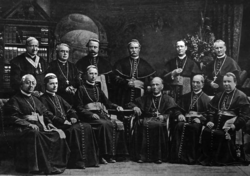
Back Klerus ALS رجل دين Arabic اكليروس ARZ Cleru AST Ruhanilər Azerbaijani Руханиҙар Bashkir Духавенства Byelorussian Духавенства BE-X-OLD Духовенство Bulgarian Clergat Catalan
This article needs additional citations for verification. (February 2021) |

Clergy are formal leaders within established religions. Their roles and functions vary in different religious traditions, but usually involve presiding over specific rituals and teaching their religion's doctrines and practices. Some of the terms used for individual clergy are clergyman, clergywoman, clergyperson, churchman, cleric, ecclesiastic, and vicegerent while clerk in holy orders has a long history but is rarely used.[citation needed]
In Christianity, the specific names and roles of the clergy vary by denomination and there is a wide range of formal and informal clergy positions, including deacons, elders, priests, bishops, preachers, pastors, presbyters, ministers, and the pope. In Christianity, clerics act as ministers in the sacrifice of the Divine Liturgy (Holy Mass, Qurbana, Eucharist, Divine Worship, Divine Service). Because they act in persona Christi capitis in the liturgy, they are relevantly distinct from the laity. Only those ordained may act as ministers in the holy ministry of Christ.
In Islam, a religious leader is often known formally or informally as an imam, caliph, qadi, mufti, mullah, muezzin and ulema. At least largely muslims do not have priests or sacrifices, their mosques do not have altars.
In the Jewish tradition, a religious leader is often a rabbi (teacher) or hazzan (cantor). The priests of the Jews are the Levites, though beacuse God limited sacrifice to the temple and the Temple was destroyed by the Romans in A.D. 70 and Jewish lineages have been nearly all mixed, the tribe of Levi, the priests of the Jews, are all gone.
© MMXXIII Rich X Search. We shall prevail. All rights reserved. Rich X Search